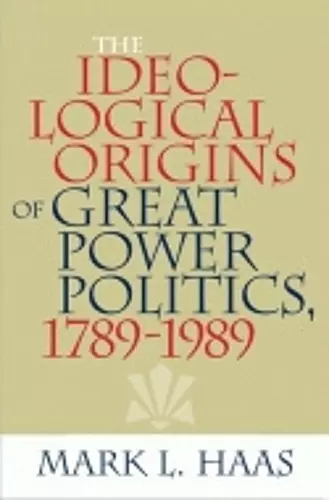The Ideological Origins of Great Power Politics, 1789–1989
Format:Paperback
Publisher:Cornell University Press
Published:22nd Oct '07
Currently unavailable, and unfortunately no date known when it will be back
This paperback is available in another edition too:
- Hardback£62.00(9780801443213)

How do leaders perceive threat levels in world politics, and what effects do those perceptions have on policy choices? Mark L. Haas focuses on how ideology shapes perception. He does not delineate the content of particular ideologies, but rather the degree of difference among them. Degree of ideological difference is, he believes, the crucial factor as leaders decide which nations threaten and which bolster their state's security and their own domestic power. These threat perceptions will in turn impel leaders to make particular foreign-policy choices. Haas examines great-power relations in five periods: the 1790s in Europe, the Concert of Europe (1815–1848), the 1930s in Europe, Sino-Soviet relations from 1949 to 1960, and the end of the Cold War. In each case he finds a clear relationship between the degree of ideological differences that divided state leaders and those leaders' perceptions of threat level (and so of appropriate foreign-policy choices). These relationships held in most cases, regardless of the nature of the ideologies in question, the offense-defense balance, and changes in the international distribution of power.
Realist theory claims that nations are motivated by considerations of power. In this impressive book, Mark L. Haas contends that ideology has played a far greater role in shaping politics among major states over the last two centuries than realism expects. Searching for a systematic impact, Haas argues that the degree of ideological 'distance' between great powers has been crucial in how their leaders define interests and perceive threats. It is not the content of a state's ideology—defined as its prevailing political principles—that matters so much as it is the ideological affinities or differences between states. Haas expects that, like birds of a feather, similar sorts of states, regardless of whether they are liberal, monarchist, communist, or fascist, will tend to flock together. Haas is most convincing in showing that power and ideology operate together in shaping perceptions of threats and interests.
(Foreign Affairs)This is a definite must-read. Haas is an effective writer; each of the case studies is meticulously researched, and the evidence marshaled in support of the hypotheses is impressive. Overall, he makes a strong case for the inclusion of ideological factors, specifically distance, in examining and predicting the behavior of leaders of nation-states toward each other.
(Perspectives in PolitISBN: 9780801474071
Dimensions: 235mm x 155mm x 16mm
Weight: 454g
248 pages